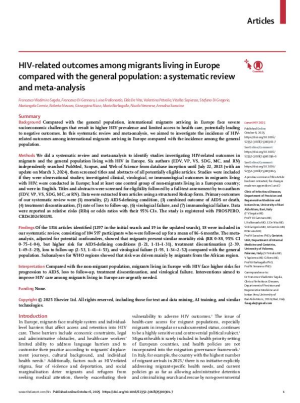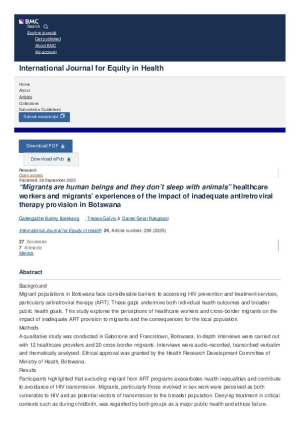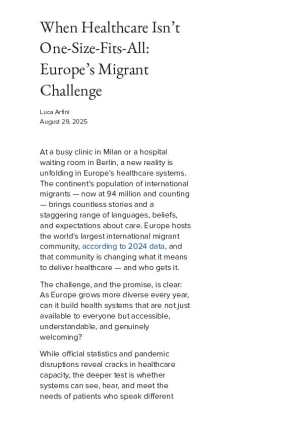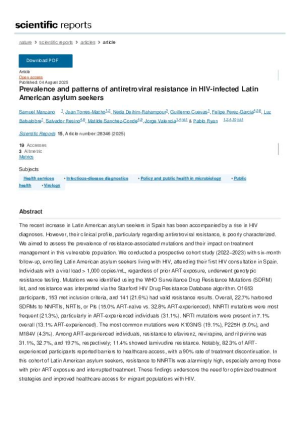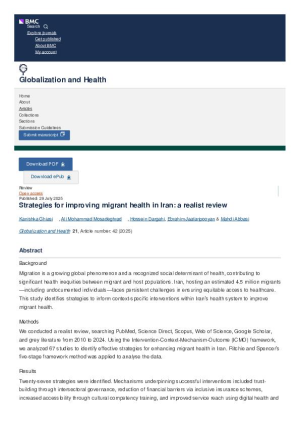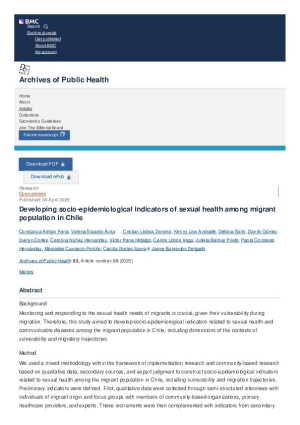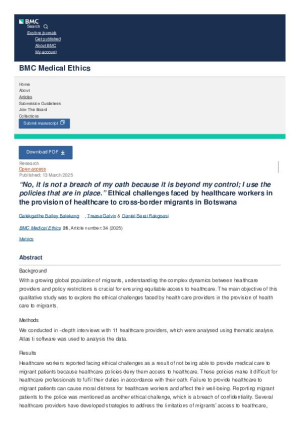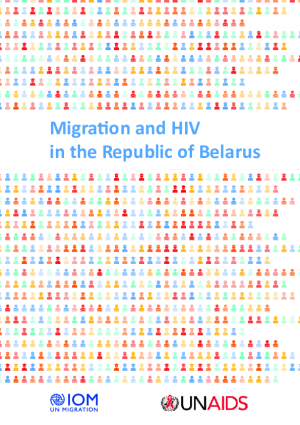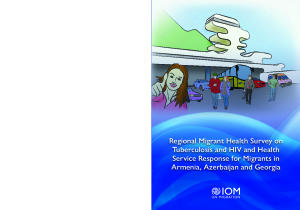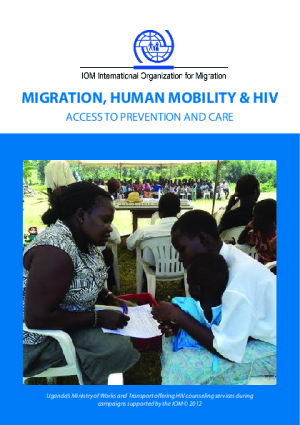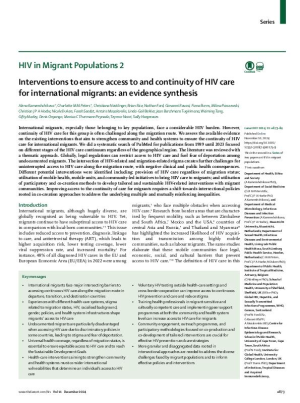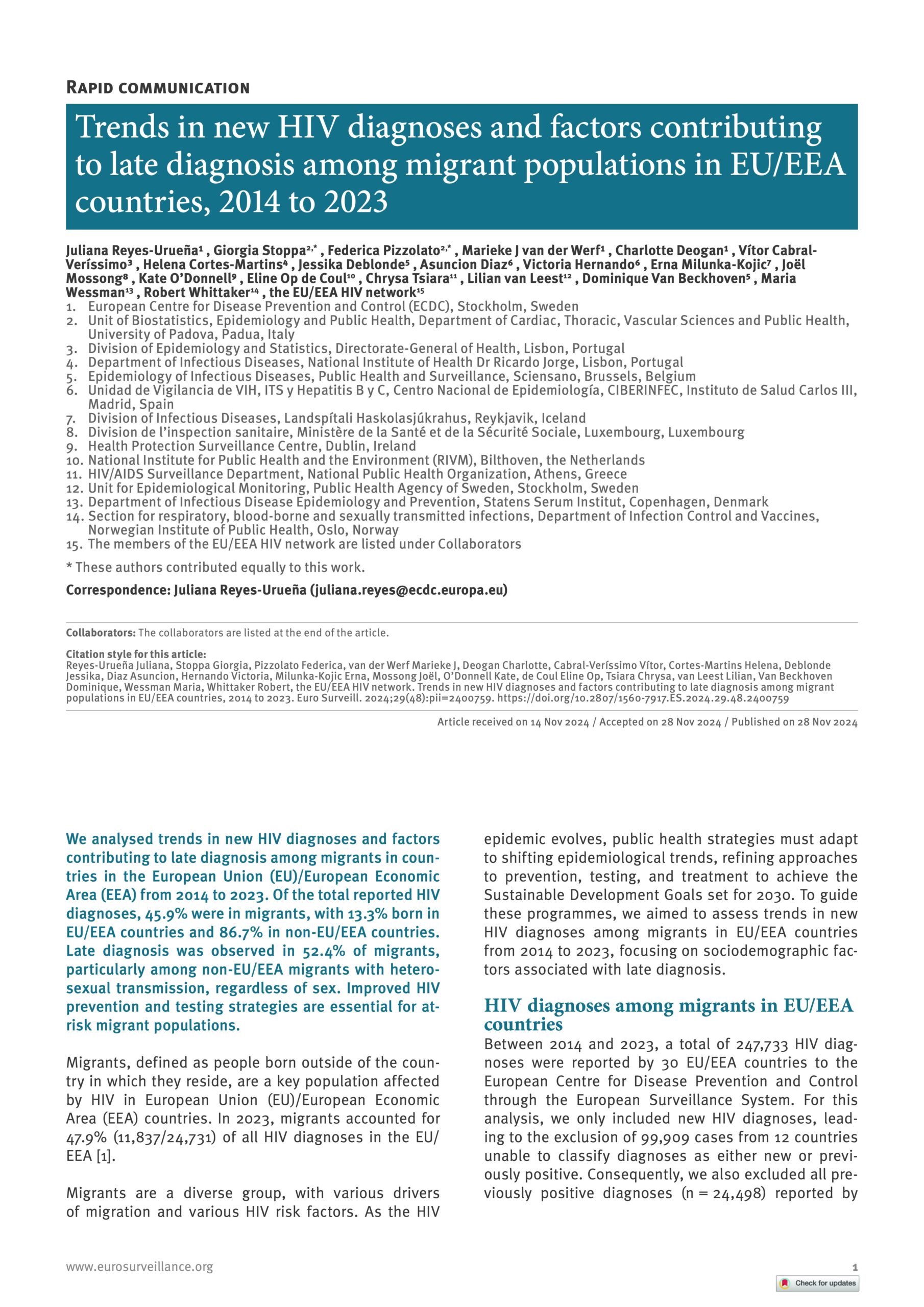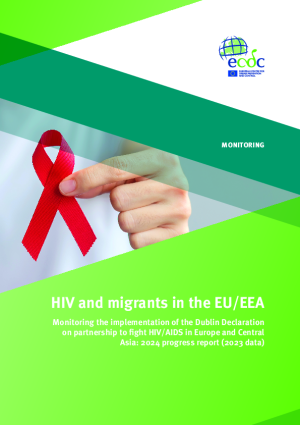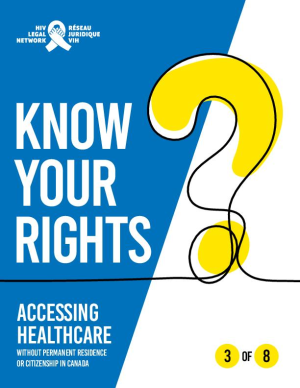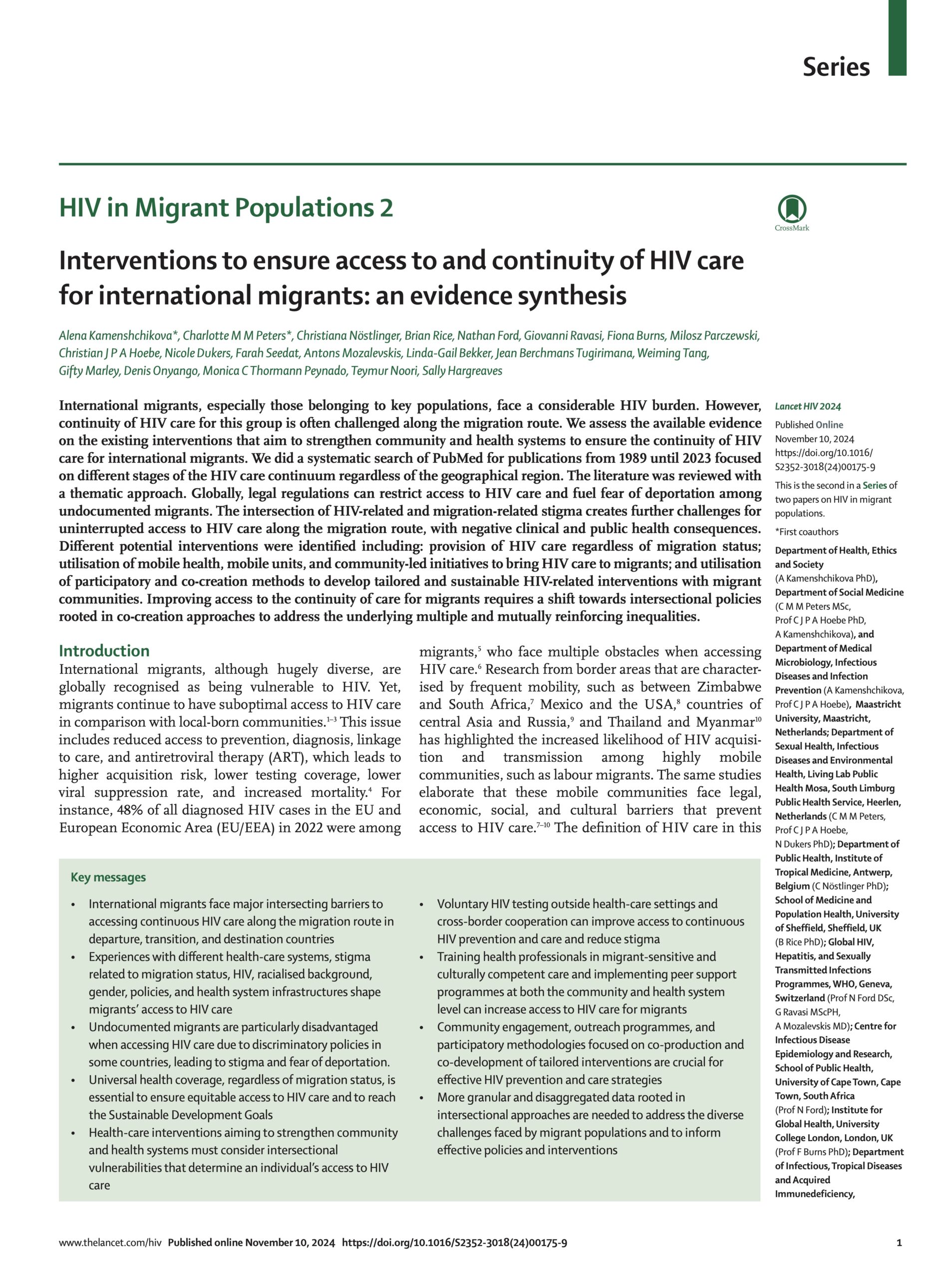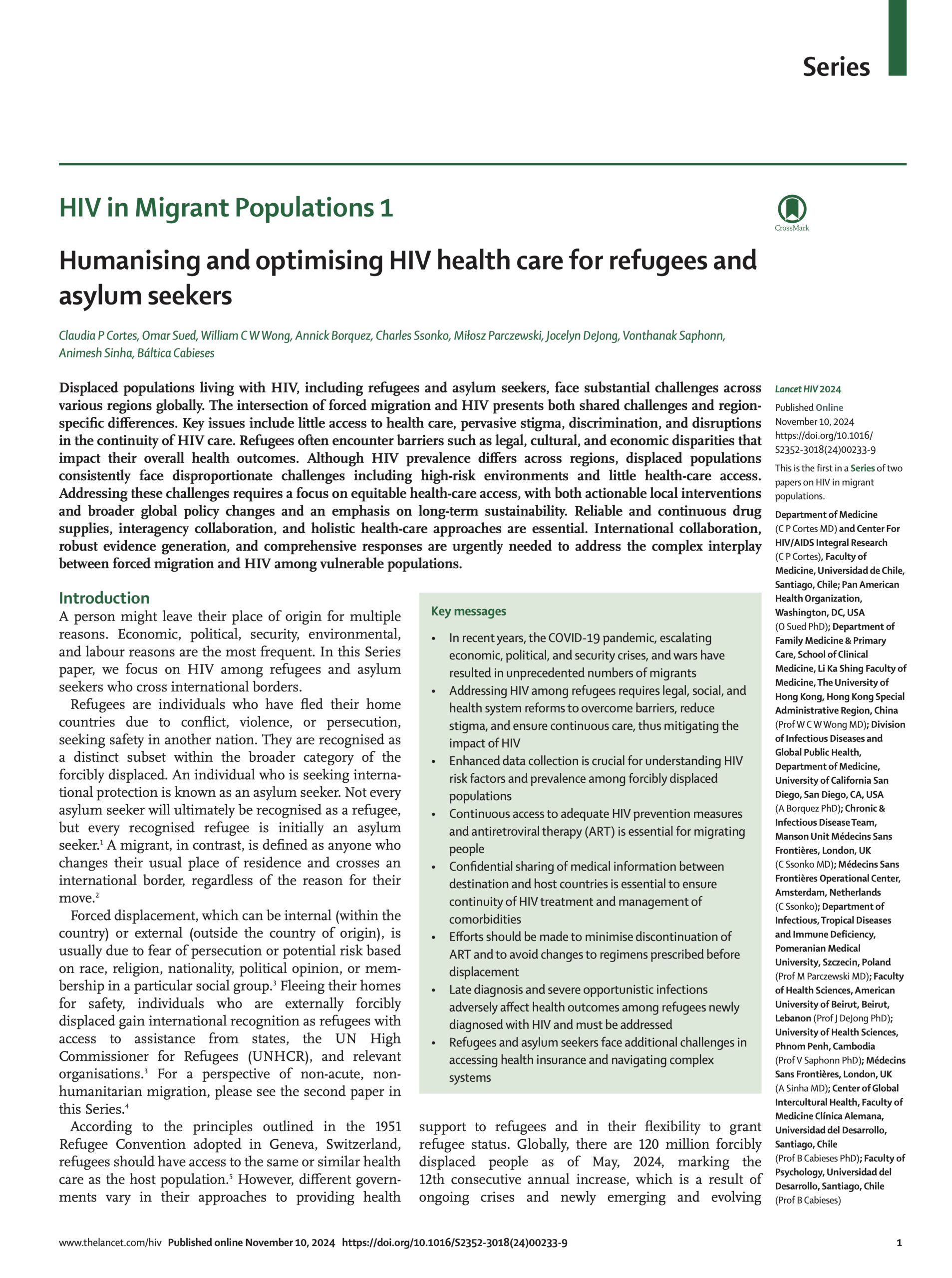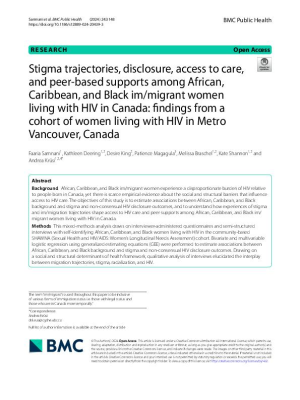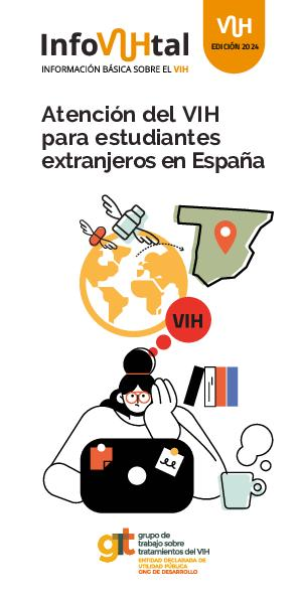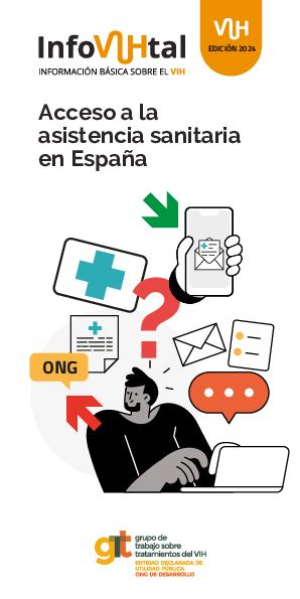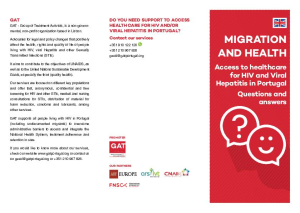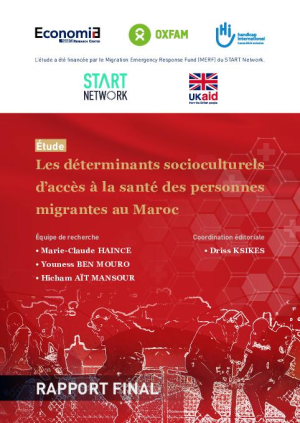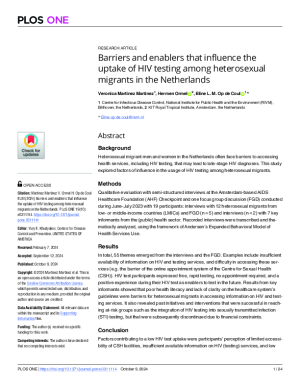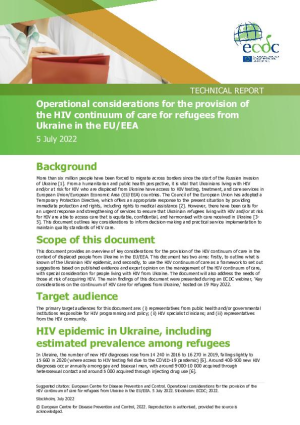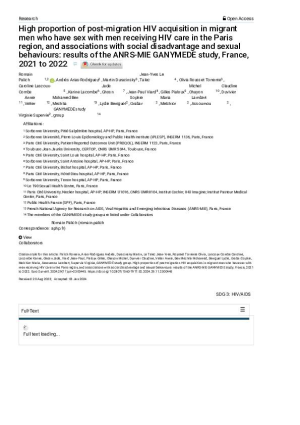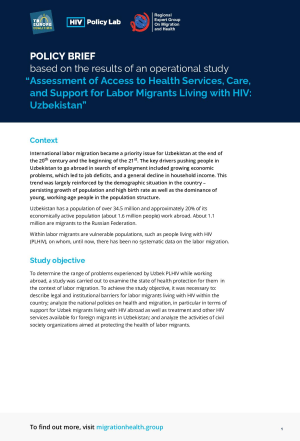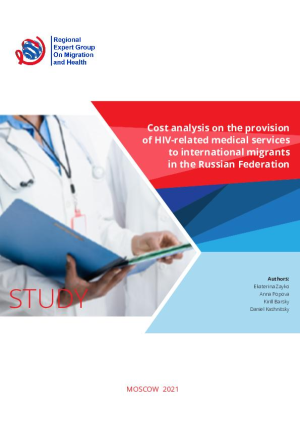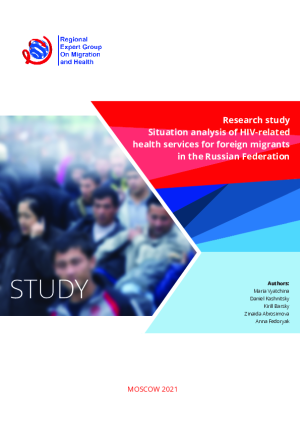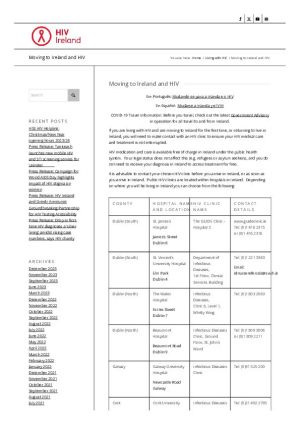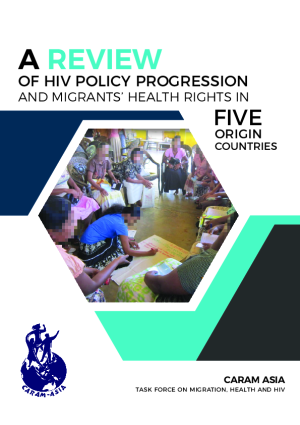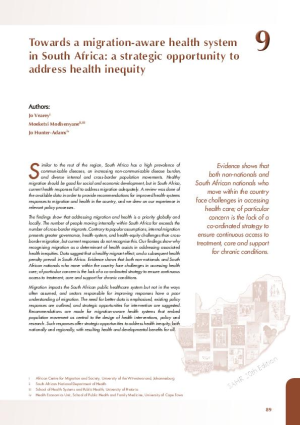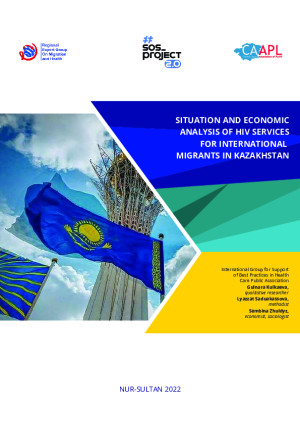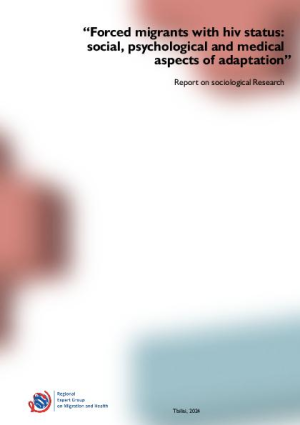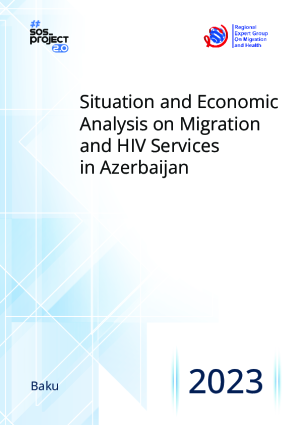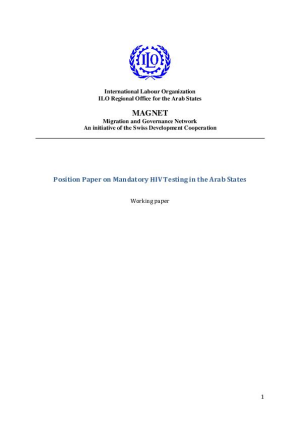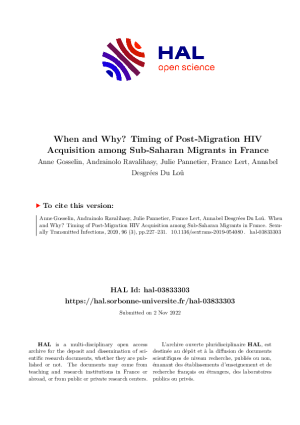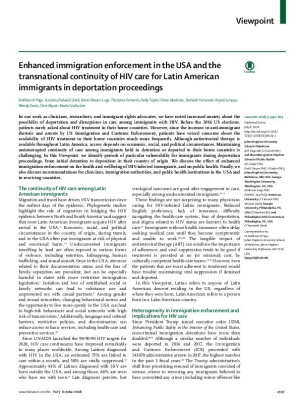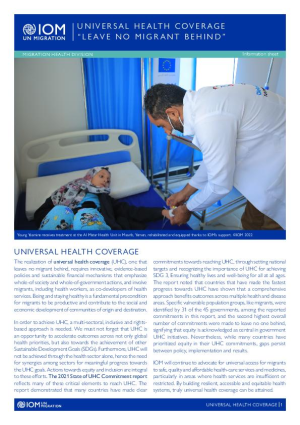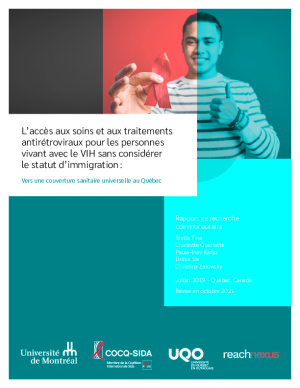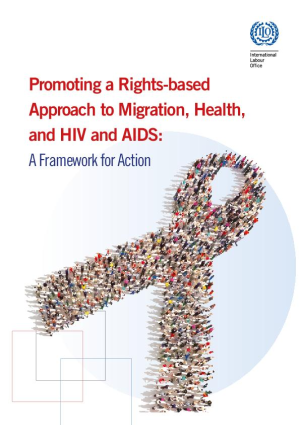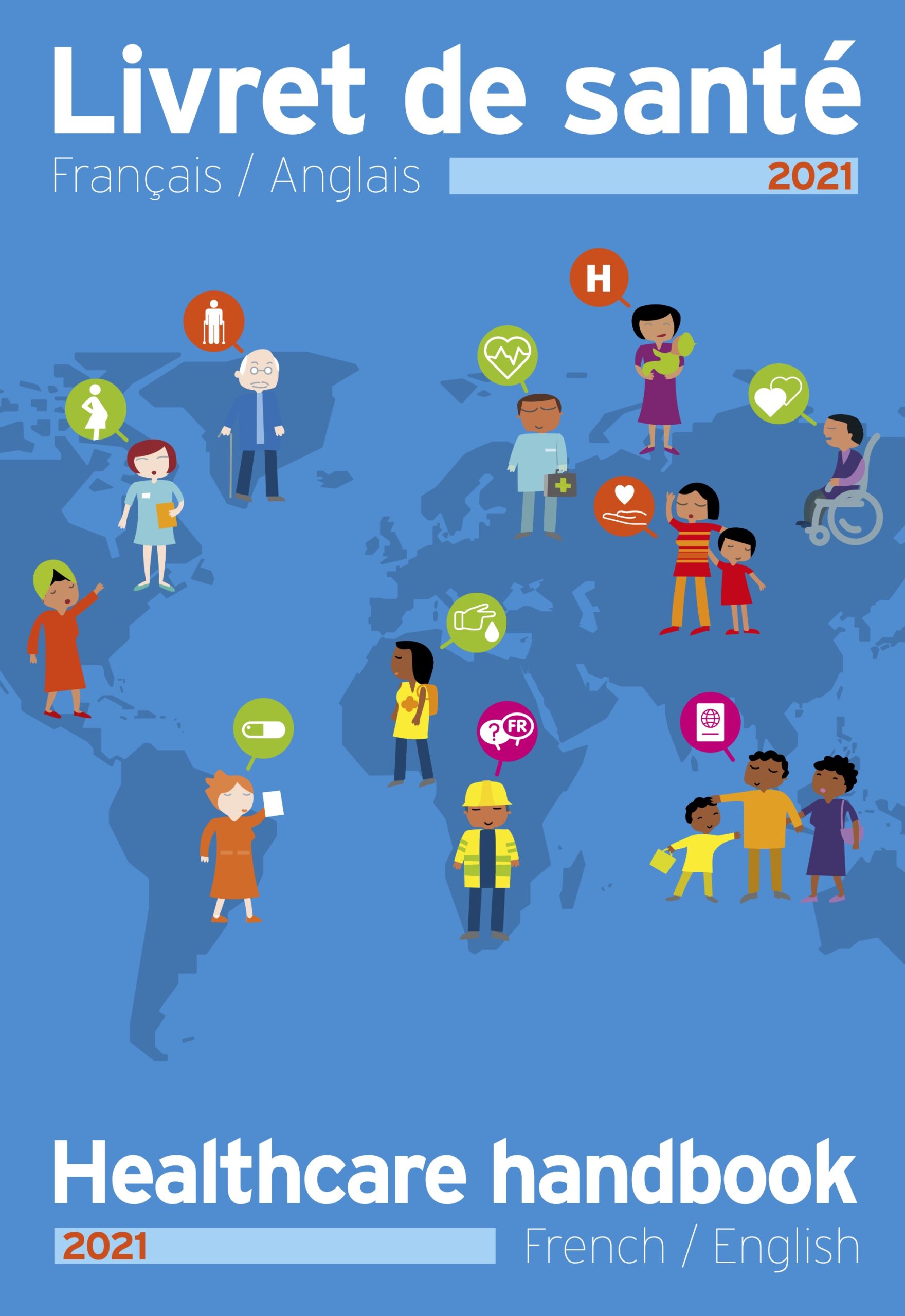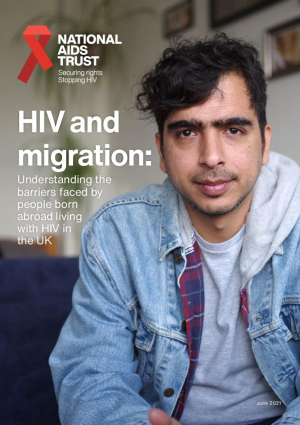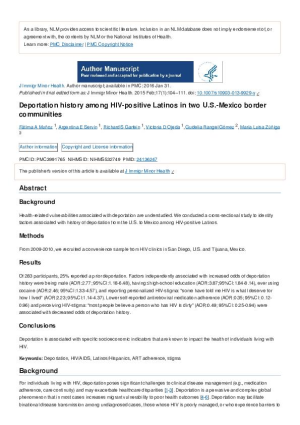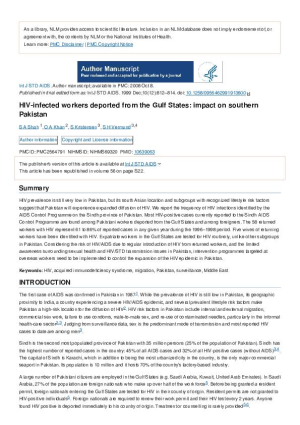Migration and Health
HIV-related outcomes among migrants living in Europe compared with the general population: a systematic review and meta-analysis
Compared with the general population, international migrants arriving in Europe face severe socioeconomic challenges that result in higher HIV prevalence and limited access to health care, potentially leading to negative outcomes. In this systematic review and meta-analysis, we aimed to investigate the incidence of HIV-related outcomes among international migrants arriving in Europe compared with the incidence among the general population.
- Author
- Segala, Francesco Vladimiro et al.
- Reference
- Lancet HIV 2025, Published Online October 6, 2025
- Countries
- Europe (Northen, Central, Southern and Western)
“Migrants are human beings and they don’t sleep with animals” healthcare workers and migrants’ experiences of the impact of inadequate antiretroviral therapy provision in Botswana
Migrant populations in Botswana face considerable barriers to accessing HIV prevention and treatment services, particularly antiretroviral therapy (ART). These gaps undermine both individual health outcomes and broader public health goals. This study explores the perceptions of healthcare workers and cross-border migrants on the impact of inadequate ART provision to migrants and the consequences for the local population.
- Author
- Balekang, G.B., Galvin , T. & Rakgoasi, D.S.
- Reference
- Int J Equity Health 24, 239 (2025)
- Countries
- Botswana
When healthcare isn’t one-size-fits-all: Europe’s migrant challenge
As Europe grows more diverse every year, can it build health systems that are not just available to everyone but accessible, understandable, and genuinely welcoming? This article explores the challenges migrants face in accessing care, from language and cultural barriers to gaps in provider training, and highlights the need for truly inclusive healthcare.
- Author
- Luca Arfini
- Reference
- August 2025 - Medscape
- Countries
- Europe (Northen, Central, Southern and Western)
Real-world experience of barriers to diagnosis, early detection and disease management among migrants living with HIV in Spain: a qualitative study
Qualitative study describing the barriers and challenges in the medical care management of a group of migrants living with HIV who received medical assistance through the Spanish Public Health Care Services.
- Author
- Martín-Sanz, M. B., Martin-Segarra, O., Palacios-Ceña, D., Gil-Crujera, A., Gómez-Sánchez, S. M., & Velasco-Arribas, M.
- Reference
- Annals of Medicine, 57(1). 2025
- Countries
- Spain
Prevalence and patterns of antiretroviral resistance in HIV-infected Latin American asylum seekers
The recent increase in Latin American asylum seekers in Spain has been accompanied by a rise in HIV diagnoses. However, their clinical profile, particularly regarding antiretroviral resistance, is poorly characterized. This study aimed to assess the prevalence of resistance-associated mutations and their impact on treatment management in this vulnerable population. In this cohort of Latin American asylum seekers, resistance to NNRTIs was alarmingly high, especially among those with prior ART exposure and interrupted treatment. These findings underscore the need for optimized treatment strategies and improved healthcare access for migrant populations with HIV.
- Author
- Manzano, S., Torres-Macho, J., Deihim-Rahampour, N. et al.
- Reference
- Sci Rep 15, 28346 (2025)
- Countries
- Spain
Strategies for improving migrant health in Iran: a realist review
Iran, hosting an estimated 4.5 million migrants—including undocumented individuals—faces persistent challenges in ensuring equitable access to healthcare. This study identifies strategies to inform context-specific interventions within Iran’s health system to improve migrant health.
- Author
- Ghiasi, K., Mosadeghrad, A.M., Dargahi, H. et al.
- Reference
- Global Health 21, 42 (2025)
- Countries
- Iran
Understanding care experiences amongst immigrant and refugee clients in a Ryan-White funded HIV clinic
Immigrants and refugees with HIV in high-income countries face unique challenges navigating their diagnoses due to cultural, social, and structural barriers, which impact access and adherence to care. This project sought to improve care systems by gathering experiences from clients and care providers.
- Author
- Zhang, S., Obeng-Nyarkoh, Pi., Altomare, A. et al.
- Reference
- Commun Med 5, 225 (2025)
- Countries
- United States - USA
Developing socio-epidemiological indicators of sexual health among migrant population in Chile
This study aimed to develop socio-epidemiological indicators related to sexual health and communicable diseases among the migrant population in Chile, including dimensions of the contexts of vulnerability and migratory trajectories.
- Author
- Adrian Parra, C., Stuardo Ávila, V., Lisboa Donoso, C. et al.
- Reference
- Arch Public Health 83, 98 (2025)
- Countries
- Chile
“No, it is not a breach of my oath because it is beyond my control; I use the policies that are in place.” Ethical challenges faced by healthcare workers in the provision of healthcare to cross-border migrants in Botswana
Qualitative study exploring the ethical challenges faced by health care providers in the provision of health care to migrants in Botswana.
- Author
- Balekang, G.B., Galvin, T. & Rakgoasi, D.S.
- Reference
- BMC Med Ethics 26, 34 (2025). https://doi.org/10.1186/s12910-025-01195-4
- Countries
- Botswana
Migration and HIV in the Republic of Belarus
This publication presents the findings of a 2018 IOM study in Belarus, funded by UNAIDS, on the link between migration and HIV. The study assessed HIV awareness among international drivers, foreign students, and migrant workers, revealing low knowledge levels that increase behavioral risks. The results highlight the need for large-scale preventive initiatives and improved access to HIV testing and treatment through effective policies.
- Author
- IOM and UNAIDS
- Reference
- 2019
- Countries
- Belarus
Regional Migrant Health Survey on Tuberculosis and HIV and Health Service Response for Migrants in Armenia, Azerbaijan and Georgia
This regional survey report presents findings from qualitative and quantitative surveys among migrants in the South Caucasus countries of Armenia, Azerbaijan and Georgia. The objective of the qualitative survey was to assess experiences with and access to public health-care services related to HIV and tuberculosis (TB) in migrants’ own countries and abroad.
- Author
- International Organization for Migration (IOM)
- Reference
- 2019
- Countries
- Georgia, Armenia, Azerbaijan
Migration, human mobility and HIV – Access to prevention and care
This publication discusses the intersection of migration, human mobility, and HIV vulnerability. It highlights how migrants face increased risks of HIV due to factors such as poor working conditions, social exclusion, legal barriers, and lack of access to healthcare. The document emphasizes the need for migrant-sensitive health systems, cross-border partnerships, and inclusive policies to ensure access to HIV prevention, testing, and treatment. It also presents case studies from various countries, demonstrating how targeted interventions can reduce HIV risks among migrant populations. The report underscores the economic and social benefits of providing HIV services to migrants while advocating for stronger global cooperation in addressing these health challenges.
- Author
- IOM
- Reference
- July 2014
- Countries
- Global
IOM guide for HIV counsellors – IOM HIV counselling in the context of Migration Health Assessment
This Guide was designed within the United States Refugee Program (USRP) with the support of the United States Department Bureau of Population, Refugees, and Migration (PRM) and is focused on HIV counselling within the context of resettlement. However, the same HIV counselling principles most certainly apply to other contexts. It is hoped, for example, that professionals working on non-voluntary HIV testing might find the document useful.
- Author
- International Organization for Migration
- Reference
- 2006
- Countries
- Global
Health Needs and Access to Healthcare Services in Migrant Populations in Greece: Data From the Hprolipsis Study
Migration to Greece continues with a constant influx of immigrants from several countries. The importance and necessity of data related to migrants’ health and needs are widely recognized, yet scarce and sporadic. This analysis aims to present data on migrants’ health needs and to investigate potential barriers to meeting them.
- Author
- Anagnostou O, Kalpourtzi N, Karakosta A, et al. (January 29, 2025).
- Reference
- Cureus 17(1): e78196. doi:10.7759/cureus.78196
- Countries
- Greece
Interventions to ensure access to and continuity of HIV care for international migrants: an evidence synthesis
International migrants, especially those belonging to key populations, face a considerable HIV burden. However, continuity of HIV care for this group is often challenged along the migration route. This article assesses the available evidence on the existing interventions that aim to strengthen community and health systems to ensure the continuity of HIV care for international migrants. A systematic search of PubMed for publications from 1989 until 2023 was conducted, focused on different stages of the HIV care continuum regardless of the geographical region.
Globally, legal regulations can restrict access to HIV care and fuel fear of deportation among undocumented migrants. The intersection of HIV-related and migration-related stigma creates further challenges for uninterrupted access to HIV care along the migration route, with negative clinical and public health consequences. Different potential interventions were identified including: provision of HIV care regardless of migration status; utilisation of mobile health, mobile units, and community-led initiatives to bring HIV care to migrants; and utilisation of participatory and co-creation methods to develop tailored and sustainable HIV-related interventions with migrant communities. Improving access to the continuity of care for migrants requires a shift towards intersectional policies rooted in co-creation approaches to address the underlying multiple and mutually reinforcing inequalities.
- Author
- Kamenshchikova, Alena et al.
- Reference
- The Lancet HIV, Volume 11, Issue 12, e873 - e884
- Countries
- Global
Trends in new HIV diagnoses and factors contributing to late diagnosis among migrant populations in EU/EEA countries, 2014 to 2023
Migrants are a diverse group, with various drivers of migration and various HIV risk factors. As the HIV epidemic evolves, public health strategies must adapt to shifting epidemiological trends, refining approaches to prevention, testing, and treatment to achieve the Sustainable Development Goals set for 2030. To guide these programmes, this study aimed to assess trends in new HIV diagnoses among migrants in EU/EEA countries from 2014 to 2023, focusing on sociodemographic factors associated with late diagnosis.
- Author
- Reyes-Urueña Juliana et al.
- Reference
- Euro Surveill. 2024;29(48):pii=2400759
- Countries
- Poland, Norway, Bulgaria, Romania, Austria, Croatia, Slovakia, EECA - Eastern Europe and Central Asia, Cyprus, Slovenia, Spain, Estonia, Czech Republic, Portugal, Hungary, Malta, Ireland, European Union - EU, Italy, Latvia, Lithuania, Iceland, Luxembourg, Finland, Belgium, Denmark, France, Germany, Greece, Netherlands, Sweden
HIV and migrants in the EU/EEA Monitoring the implementation of the Dublin Declaration on partnership to fight HIV/AIDS in Europe and Central Asia: 2024 progress report (2023 data)
This report presents the results of a survey among EU/EEA Member States in relation to the HIV epidemic among migrants and current national prevention interventions, policies and barriers to the public health response.
- Author
- European Centre for Disease Prevention and Control (ECDC)
- Reference
- November 2024
- Countries
- Italy, Latvia, Lithuania, Luxembourg, Poland, Bulgaria, Romania, Finland, Croatia, Slovakia, Austria, Cyprus, Slovenia, Spain, Estonia, Czech Republic, Portugal, Hungary, Malta, Ireland, European Union - EU, Belgium, Denmark, France, Germany, Greece, Netherlands, Sweden
Know your rights: Accessing healthcare without permanence residence or citizenship in Canada
This guide provides essential information on accessing healthcare and HIV medication in Canada, particularly for individuals who might face barriers due to their immigration or insurance status. It explains Canada’s universal healthcare system, who is eligible for public healthcare, and options like the Interim Federal Health Program (IFHP) for refugees and other groups. The guide also covers alternative ways to access healthcare and medication for those without insurance, discusses the possibility of bringing medication from one's home country, and addresses concerns about how accessing healthcare might affect immigration status.
The guide is also available in French
- Author
- HIV Legal Network
- Reference
- 26 November 2024
- Countries
- Canada
US: What to do if you lose your HIV medications while traveling
The article provides a guide on what to do if you lose or forget your HIV medications while traveling. It offers practical advice for accessing medications, such as contacting your health provider, insurance, local HIV services, or even the drug manufacturer. It also covers challenges like international travel, mailing restrictions, and prevention tips, including packing medications in carry-on luggage and considering long-acting injectable treatments.
- Author
- The Body
- Reference
- Nov 2024
- Countries
- United States - USA
Interventions to ensure access to and continuity of HIV care for international migrants: an evidence synthesis
- Author
- Kamenshchikova, Alena et al.
- Reference
- The Lancet HIV - SERIESHIV in Migrant Populations - Online first - 10th November 2024
- Countries
- Global
Humanising and optimising HIV health care for refugees and asylum seekers
- Author
- Cortes, Claudia P et al.
- Reference
- The Lancet HIV, SERIESHIV in Migrant Populations - Online first - November 10, 2024
- Countries
- Global
Stigma trajectories, disclosure, access to care, and peer-based supports among African, Caribbean, and Black im/migrant women living with HIV in Canada: findings from a cohort of women living with HIV in Metro Vancouver, Canada
African, Caribbean, and Black im/migrant women experience a disproportionate burden of HIV relative to people born in Canada, yet there is scarce empirical evidence about the social and structural barriers that influence access to HIV care. The objectives of this study is to estimate associations between African, Caribbean, and Black background and stigma and non-consensual HIV disclosure outcomes, and to understand how experiences of stigma and im/migration trajectories shape access to HIV care and peer supports among African, Caribbean, and Black im/migrant women living with HIV in Canada.
- Author
- Samnani, F., Deering, K., King, D. et al.
- Reference
- BMC Public Health 24, 3148 (2024). https://doi.org/10.1186/s12889-024-20439-3
- Countries
- Canada
Migrants and Refugees: Health Access
Leaflet summarising the functioning of the South African Health System, the laws governing access to healthcare and what it means for migrants and refugees.
- Author
- Scalabrini and Sonker Gender Justice
- Countries
- South Africa
HIV care for foreign students in Spain
Guide for foreign students in Spain on how to access HIV care and treatment. The guide is also available in English, French, Portuguese; Russian, Romanian, Arabic, and Wolof
- Author
- gTt
- Reference
- 2024
- Countries
- Spain
Migration and health access to healthcare for HIV and Viral hepatitis in Portugal
Questions and answers on access to healthcare for migrants living with HIV and viral hepatitis in Portugal.
- Author
- GAT
- Countries
- Portugal
Morocco: Les déterminants socioculturels d’accès à la santé des personnes migrantes au Maroc
Socio-cultural determinants of access to healthcare for migrants in Morocco (This report is in French)
The aim of this study is firstly to cross-reference the data collected from three groups (migrants, staff from civil society associations and healthcare professionals), and then with other data collected as part of a pre-study aimed at documenting the living conditions and effects of the Covid-19 situation on sub-Saharan migrants. This triangulation of data made it possible to qualify the initial findings and to propose a more exhaustive and representative description of the main social determinants that influence and limit sub-Saharan migrants' access to healthcare services in Morocco, namely those linked to the migration experience (route and migration status) and living conditions (employment and working conditions, employment and income security, food and food security, social protection, quality and affordable housing).
The proposed recommendations come from both the research team and the project partners. They are addressed to public decision-makers, Moroccan civil society organisations, international organisations and the various players involved in the governance and practice of healthcare professions. They are intended to help adapt the interventions and actions of the various structures and people working with these populations, so as to guarantee their right to health.
French summary: Cette étude se propose d'abord de croiser les données recueillies auprès de trois groupes entre elles (personnes migrantes, personnels des associations de la société civile et professionnel.le.s de la santé) , puis avec d’autres données recueillies dans le cadre d’une pré-étude visant à documenter les conditions de vie et les effets de la situation du Covid-19 sur les personnes migrantes subsahariennes. Cette triangulation des données a permis de nuancer les constats de départ et de proposer une description plus exhaustive et plus représentative des principaux déterminants sociaux qui influencent et limitent l’accès des personnes migrantes subsahariennes aux services de santé au Maroc, à savoir ceux liés à l’expérience migratoire (parcours et statut migratoire) et aux conditions de vie (l’emploi et les conditions de travail, l’emploi et la sécurité de revenu, l’alimentation et la sécurité alimentaire, la protection sociale, le logement, de qualité et abordable).
Les recommandations proposées proviennent aussi bien de l’équipe de recherche que des partenaires du projet. Elles sont adressées aux décideurs publics, aux organisations de la société civile marocaine, aux organisations internationales et aux divers acteurs et actrices, agissant dans la gouvernance et la pratique des métiers de santé. Elles ont pour vocation d’aider à adapter les interventions et les actions des diverses structures et personnes intervenant auprès de ces populations, de manière à garantir leur droit à la santé.
- Author
- Marie-Claude HAINCE et al
- Reference
- 2021
- Countries
- Morocco
Barriers and enablers that influence the uptake of HIV testing among heterosexual migrants in the Netherlands
This study examined barriers and facilitators influencing the use of HIV testing services among heterosexual migrants in the Netherlands. The research involved qualitative interviews with 12 migrants from low- and middle-income countries and key informants from the health sector, along with a focus group. The study concluded that low HIV testing uptake among migrants was influenced by limited access to services, lack of information, and low perceived risk. Improvements in service accessibility and communication could enhance testing rates among this group.
- Author
- Martinez Martinez V, Ormel H, Op de Coul ELM (2024)
- Reference
- PLoS ONE 19(10): e0311114. https://doi.org/10.1371/journal.pone.0311114
- Countries
- Netherlands
Regional Migrant Health Survey on Tuberculosis and HIV and Health Service Response for Migrants in Armenia, Azerbaijan and Georgia
This regional survey report presents findings from qualitative and quantitative surveys among migrants in the South Caucasus countries of Armenia, Azerbaijan, and Georgia. The objective of the qualitative survey was to assess experiences with and access to public health-care services related to HIV and tuberculosis (TB) in migrants’ own countries and abroad. Specific goals were to clarify barriers in availability, accessibility, acceptability, and quality (AAAQ) of TB and HIV health services for migrants within the countries of origin and destination, as well as collect recommendations and opinions for improving AAAQ of TB and HIV health services for migrants.
- Author
- Lisa G. Johnston for IOM
- Reference
- 2019
- Countries
- Georgia, Armenia, Azerbaijan
Operational considerations for the provision of the HIV continuum of care for refugees from Ukraine in the EU/EEA
This document provides an overview of key considerations for the provision of the HIV continuum of care in the context of displaced people from Ukraine in the EU/EEA. This document has two aims: firstly, to outline what is known of the Ukrainian HIV epidemic, and secondly, to use the HIV continuum of care as a framework to set out suggestions based on published evidence and expert opinion on the management of the HIV continuum of care, with special consideration for people living with HIV from Ukraine. The document will also address the needs of those at risk of acquiring HIV. The main findings of this document were presented during an ECDC.
- Author
- European Centre for Disease Prevention and Control
- Reference
- July 2022
- Countries
- EECA - Eastern Europe and Central Asia, Europe (Northen, Central, Southern and Western)
Migrant Health Training Toolkit
This toolkit offers resources and practical information for migrant health advocates working to improve the HIV-related health outcomes of migrants in precarious circumstances across the European region. These materials can be used when working directly with migrants or when engaging in HIV-, healthcare- and/or immigration-related advocacy. This toolkit draws on content from AAF and Mi-Health Europe’s annual training programme for migrant health advocates, Mi-Care.
- Author
- Mi-Health
- Reference
- 2023
- Countries
- Europe (Northen, Central, Southern and Western)
High proportion of post-migration HIV acquisition in migrant men who have sex with men receiving HIV care in the Paris region, and associations with social disadvantage and sexual behaviours: results of the ANRS-MIE GANYMEDE study, France, 2021 to 2022
This cross-sectional study focused on ≥ 18-year-old MSM born outside France, receiving HIV care in the Paris region. Information on migration history, socioeconomic condition, sexual activity, and health was collected in May 2021–June 2022 through self-administered questionnaires and medical records. Post-migration-HIV-acquisition rate and delay between arrival in France and HIV acquisition were estimated from biographical data and CD4+ T-cell counts. Predictors of HIV acquisition within 1 year after migration were determined using logistic regression.
- Author
- Romain Palich et al.
- Reference
- https://doi.org/10.2807/1560-7917.ES.2024.29.11.2300445
- Countries
- France
Policy brief Based on the results of an operational study “Assessment of Access to Health Services, Care, and Support for Labor Migrants Living with HIV: Uzbekistan”.
To determine the range of problems experienced by Uzbek PLHIV while working abroad, a study was carried out to examine the state of health protection for them in the context of labor migration. To achieve the study objective, it was necessary to: describe legal and institutional barriers for labor migrants living with HIV within the country; analyse the national policies on health and migration, in particular in terms of support for Uzbek migrants living with HIV abroad as well as treatment and other HIV services available for foreign migrants in Uzbekistan; and analyse the activities of civil society organisations aimed at protecting the health of labor migrants. The policy brief is also available in Russian.
- Author
- Regional Expert Group on Migration and Health
- Reference
- 2022
- Countries
- Uzbekistan
Cost analysis on the provision of HIV-related medical services to international migrants in the Russian Federation
The study provides an overview of the international experience regarding the effectiveness of antiretroviral therapy and its economic benefits for countries, as well as comparative studies on HIV detection in the resident population and migrants. Also available in Russian.
- Author
- Regional Expert Group on Migration and Health
- Reference
- 2021
- Countries
- Russian Federation
Research study: Situation analysis of HIV-related health services for foreign migrants in the Russian Federation
The report presents the result of social research to study the access of foreigners living with HIV to health services in the Russian Federation. Also available in Russian.
- Author
- Regional Expert Group on Migration
- Reference
- 2021
- Countries
- Russian Federation
Moving to Ireland and HIV
This Page is intended to provide the information needed to ensure HIV medical care and treatment is not interrupted. The self-help guide "Living with HIV in Ireland" was being updated at the time of writing.
- Author
- HIV Ireland
- Countries
- Ireland
Review of HIV Policy Progression and Migrants’ Health Rights in Five Origin Countries
This study intends to provide a brief context of the current situation of migrants’ health rights, primarily by looking at the progression of HIV and AIDS related policies and practices over time.
- Author
- CARAM Asia
- Reference
- November 2018
- Countries
- Bangladesh, Cambodia, Philippines, Sri Lanka, Pakistan
Towards a migration-aware health system in South Africa: a strategic opportunity to address health inequity
A review of the available data to provide recommendations for improved health-systems responses to migration and health in the country. The review draws on experience in relevant policy processes.
- Author
- Jo Vearey, Moeketsi Modisenyane, Jo Hunter-Adams
- Reference
- 2017 SAHR – 20 Year Anniversary Edition
- Countries
- South Africa
Situation and economic analysis of HIV services for international migrants in Kazakhstan
Presents the results of a situational and economic analysis conducted in 2021-2022, which examined the availability of health care to HIV-positive migrants temporarily residing in the Republic of Kazakhstan, and analysed the barriers and trajectories of their overcoming in access to health care for international migrants living with HIV.
- Author
- Regional Expert Group On Migration and Health
- Reference
- 2022
- Countries
- Kazakhstan
A analytical report «Forced migrants with HIV status: Social, psychological and medical aspects of adaptation»
Identifies possible barriers for newly settled PLHIV in accessing HIV diagnosis and treatment, given the substantial number of migrants arriving in Georgia. Makes recommandations.
- Author
- Regional Expert Group On Migration and Health
- Reference
- 2024
- Countries
- Georgia
Situation and Economic Analysis on Migration and HIV Services in Azerbaijan
The Study project aimed to gain an understanding of the legal and institutional barriers to receive HIV/TB care and treatment the citizens of Azerbaijan face when they return home from migration. Also, along with the legal and institutional barriers, understanding of the socio-cultural barriers to receive HIV/TB care and treatment the citizens of the foreign countries when they come to Azerbaijan as a migrant.
- Author
- Regional Expert Group On Migration and Health
- Reference
- 2023
- Countries
- Azerbaijan
Position Paper on Mandatory HIV Testing in the Arab States
Argues that mandatory HIV testing of migrant workers violates their fundamental human rights and is not a cost-effective means of preventing the spread of HIV transmission or mitigating the impacts of the epidemic. Mandatory HIV testing for employment purposes is discriminatory and violates privacy rights protected under international human rights law.
- Author
- ILO
- Reference
- 2014
- Countries
- Jordan, Egypt, Lebanon, Oman, Qatar, Syria, Tunisia, Kuwait, Yemen, United Arab Emirates - UAE, Bahrain, Iraq
When and Why? Timing of Post-Migration HIV Acquisition among Sub-Saharan Migrants in France
This study aims to estimate the timing of post-migration HIV acquisition among sub-Saharan migrants in France and to understand the correlates of post-migration infection.
- Author
- Anne Gosselin et al.
- Reference
- Sexually Transmitted Infections, 2020, 96 (3), pp.227--231.
- Countries
- France
Enhanced immigration enforcement in the USA and the transnational continuity of HIV care for Latin American immigrants in deportation proceedings
Discusses the effect of enhanced immigration enforcement on the health and wellbeing of HIV-infected immigrants, and on public health. Finally, it also discusses recommendations for clinicians, immigration authorities, and public health institutions in the USA and in receiving countries.
- Author
- Kathleen R Page, et al.
- Reference
- The Lancet HIV, Volume 5, Issue 10E597-E604, October 2018
- Countries
- United States - USA
Universal Health Coverage ” Leave no migrants behind”
Infosheet - Summarises advocacy work of IOM with case studies.
- Author
- IOM
- Reference
- 2022
- Countries
- Global
L’accès aux soins et aux traitements antirétroviraux pour les personnes vivant avec le VIH sans considérer le statut d’immigration : Vers une couverture sanitaire universelle au Québec
The aim of this report is to document the various barriers to care and treatment access, to highlight the service pathways used by people to gain access to healthcare, and to explore possible short- and long-term solutions to help people, to make the healthcare system fairer and to reduce inequalities. The report is in French.
- Author
- COCQ Sida, Reach Nexus
- Reference
- 01/10/2021
- Countries
- Canada
“Left behind”: why implementing migration-aware responses to HIV for migrant farm workers is a priority for South Africa
In this article, a social determinants of health approach is applied to explore the context within which this population struggles to access positive determinants of health, including the public health care system, and the implications of this for HIV.
- Author
- Thea de Gruchy & Jo Vearey
- Reference
- African Journal of AIDS Research Volume 19, 2020 - Issue 1
- Countries
- South Africa
Promoting a rights-based approach to migration, health, and HIV and AIDS: A framework for action
This report provides an analysis of the underlying issues around health and HIV in the context of labour migration. An overview of contemporary migration, with a focus on labour migration, is provided as basis to frame the discussion.
- Author
- International Labour Office
- Reference
- 2017
- Countries
- Global
Assessment of Access to Health Services, Care, and Support for Labor Migrants Living with HIV: Uzbekistan
Examines the state of health protection for migrants in the context of labour migration: describes legal and institutional barriers for labour migrants living with HIV within the country; analyses the national policies on health and migration, and analyses the activities of civil society organisations aimed at protecting the health of labour migrants.
- Author
- Regional Expert Group On Migration and Health
- Reference
- 2022
- Countries
- Uzbekistan
Blingual Health Book
Available in 17 languages, the Bilingual Health Books are designed to help everyone better understand the French health protection system, rights and procedures. They cover the main health issues and provide practical information for everyday life.
- Author
- COMEDE
- Reference
- 2021
- Countries
- France
HIV and migration – Understanding the barriers faced by people born abroad living with HIV in the UK
This report explores the barriers migrants face accessing HIV testing, treatment and care and makes recommendations to improve the health outcomes and quality of life of migrants living with or at risk of HIV in the UK.
- Author
- National AIDS Trust
- Reference
- June 2021
- Countries
- United Kingdom
Deportation history among HIV-positive Latinos in two U.S.-Mexico border communities
Cross-sectional study to identify factors associated with history of deportation from the U.S. to Mexico among HIV-positive Latinos.
- Author
- Fátima A. Muñoz et al.
- Reference
- J Immigr Minor Health. 2015 Feb; 17(1): 104–111.
- Countries
- Mexico, United States - USA
HIV-infected workers deported from the Gulf States: impact on southern Pakistan
This paper examines the HIV/AIDS situation in Pakistan, focusing on the Sindh province where the majority of cases have been reported. It highlights several risk factors, including migration, commercial sex work, and unsafe medical practices. The study, conducted by the Sindh AIDS Control Programme, found that a significant portion of HIV/AIDS cases from 1996 to 1998 were among workers deported from Gulf countries.
- Author
- S A Shah et al.
- Reference
- Int J STD AIDS. 1999 Dec; 10(12): 812–814.
- Countries
- Pakistan, Saudi Arabia, Kuwait, United Arab Emirates - UAE
